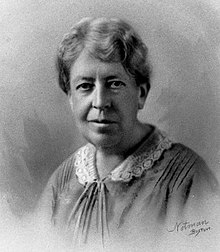
Back ماري ويتون كالكينز Arabic مارى ويتون كالكينز ARZ Mary Whiton Calkins Catalan Mary Whiton Calkins Czech Mary Whiton Calkins German Mary Whiton Calkins Spanish Mary Whiton Calkins Estonian Mary Whiton Calkins Basque مری ویتون کالکینز Persian Mary Whiton Calkins French
Mary Whiton Calkins | |
|---|---|
 | |
| Born | March 30, 1863 |
| Died | February 26, 1930 (aged 66) |
| Occupation(s) | Professor of psychology and philosophy |
| Board member of | President of the American Psychological Association, President of the American Philosophical Association |
| Academic background | |
| Education | Bachelor of Arts in classics and philosophy, unawarded PhD in psychology (see text) |
| Alma mater | Smith College, then Harvard University unofficially (see text) |
| Thesis | Association. An essay analytic and experimental. (1896) |
| Doctoral advisor | Hugo Münsterberg |
| Other advisors | |
| Academic work | |
| Discipline | Philosopher, psychologist |
| Institutions | Wellesley College |
Mary Whiton Calkins (/ˈkɔːlkɪnz, ˈkæl-/; 30 March 1863 – 26 February 1930[1]) was an American philosopher and psychologist, whose work informed theory and research of memory, dreams and the self. In 1903, Calkins was the twelfth in a listing of fifty psychologists with the most merit, chosen by her peers. Calkins was refused a Ph.D. by Harvard University because of her gender.
Calkins is a key figure in the history of women psychologists. At Wellesley College, Calkins established the first psychological laboratory for women. She was the first woman to complete the requirements for a doctoral degree in psychology with the unanimous support of the Harvard University psychology faculty, although the university refused to bestow it on the grounds that Harvard did not accept women. She later became president of the American Psychological Association and the American Philosophical Association, and was the first woman to be president of both.
She taught psychology and philosophy at Wellesley College for four decades, and conducted research there and at Harvard University for the majority of that time.
- ^ Johnson, Deborah (1999). "Calkins, Mary Whiton". American National Biography. New York: Oxford University Press. (subscription required)